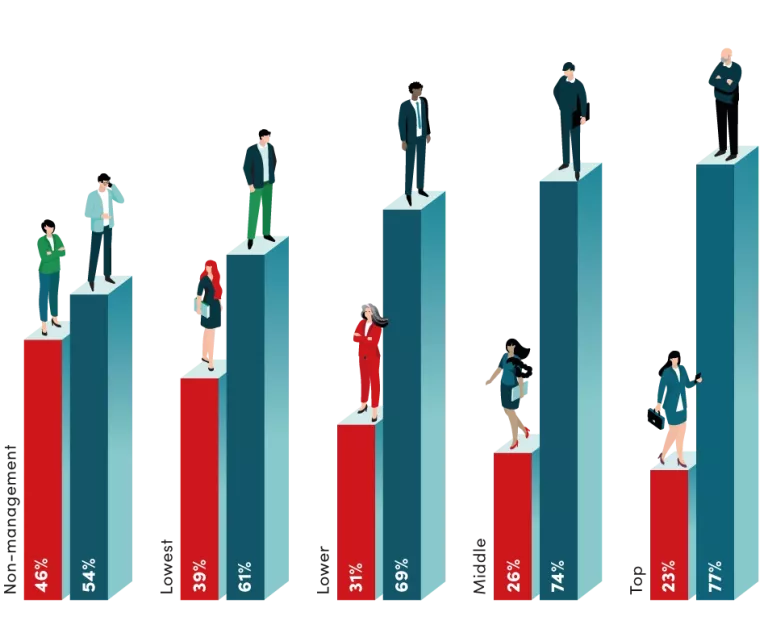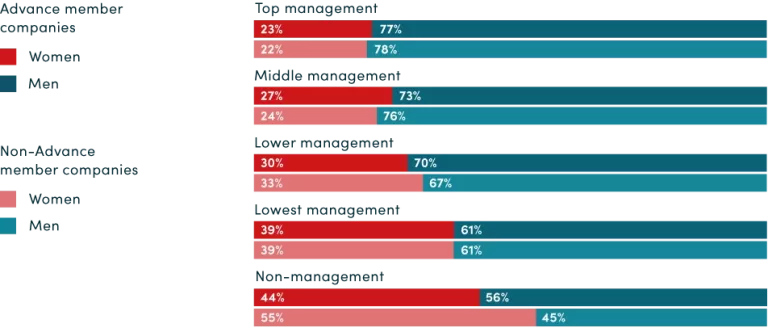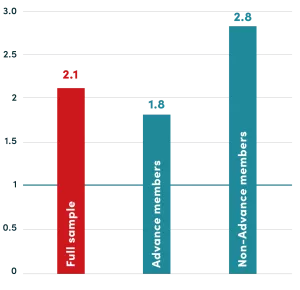The GIR Key Figures section returns again in 2025. These key figures will continue to be your constant companion through each year’s GIR.

Looking at gender distribution across all management levels, it shows that participating companies still have a long way to go to reach gender parity in the workplace.
Although women make up 46% of non-management roles, they hold just 23% of top management positions. The leaky pipeline, where women are (nearly) equally present in non-management but remain scarce at the top, has been a consistent theme in every edition of the Gender Intelligence Report. 2025 is no exception.

To show progress over time and allow for accurate comparability, we created a sub-sample of 67 companies with ???305,600??? employees’ HR data from companies that participated in the report in both 2024 and 2025.
Top management
+1 percentage points
Middle management
+2 percentage point
Lower management
+1 percentage points
Lowest management
0 percentage points
Management overall
0 percentage points
Looking at all management levels, the percentage of women remained unchanged between 2024 and 2025. Looking at the different management levels, we can see that the share of women did not change in the lowest management either, but increased by one percentage point in lower management as well as in top management and by two percentage points in middle management. This reflects only limited progress.
In 2025, Advance members do better than non-Advance members regarding the share of women in top and middle management. In lowest management, women at Advance member companies and non-Advance member companies represent 30% of the total. However, the pattern is the same in all companies, and the share of women decreases at each management level.

The Glass Ceiling Indey (GCI) shows that across the board, women are underrepresented in middle and top management positions. This is considerably more pronounced in non-Advance than Advance companies.
When looking at the development between 2024 and 2025, there is very limited improvement in the glass ceiling index, it decreased by 0.2 in advance member companies, but increased by 0.1 in non-advance member companies.

If women are represented in similar proportions across all hierarchy levels they can reach management positions without significant hurdles. The Glass Ceiling Index compares the gender distribution in management (or at a specific management level) with the gender distribution in the overall workforce. A Glass Ceiling Index of 2 would indicate that the overrepresentation of men at a particular management level doubles. If men are represented at a ratio of 1:1.5 in the overall workforce (e.g., 40% to 60%), then at a specific management level, men are represented at a ratio of 1:3 (e.g., 25% to 75%).
A GCI of 1 is optimal and means that the gender distribution at a given management level is the same as in the overall workforce. This optimal value means no female talent is lost on the way up. If the index is above 1, women are underrepresented (compared to their share of the total workforce). The higher the value, the thicker the Glass Ceiling and the more pronounced the overrepresentation of men. If the index is above 1, improvement is shown as a decrease in the index value.